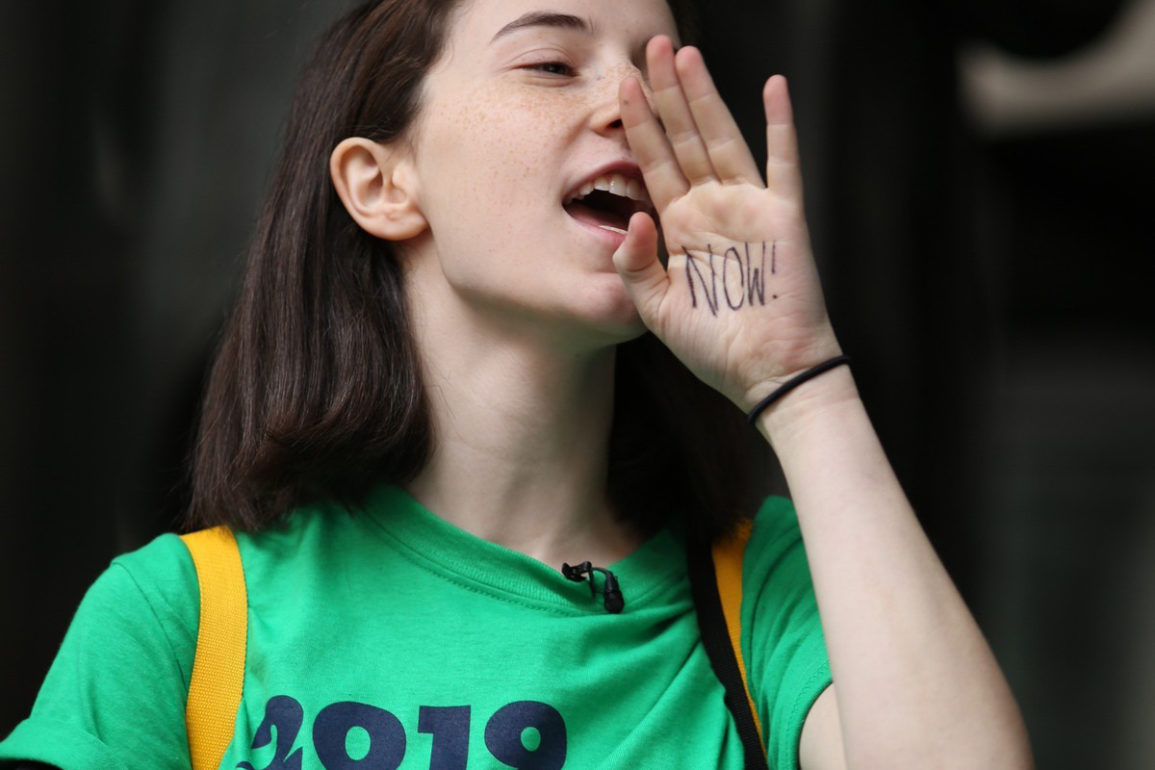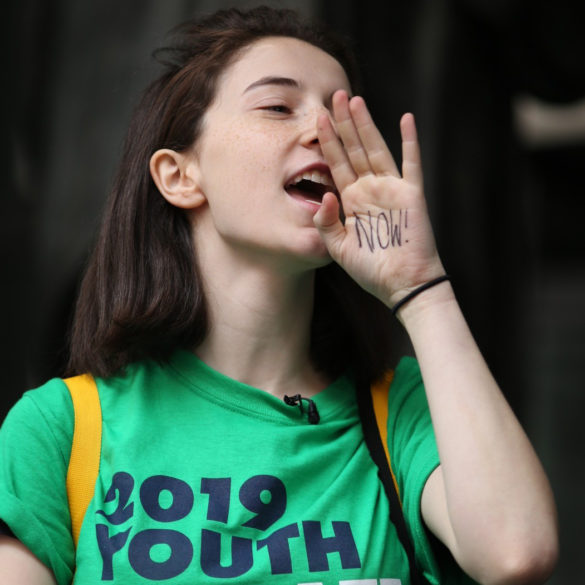Katie Eder is part of a generation that has taken the threat of climate change head on.
Katie Eder is like any other 19-year-old. She enjoys hanging out with friends and family, art, and writing, but she also has a full-time job (or, as she puts it, “a full-time life”) of being an environmental activist.
“I think that a lot of people keep their denial of the problem [climate change] because they aren’t able to comprehend what is happening or what could possibly happen,” says Katie. “They push it away.”
Everything was put into perspective for her in 6th grade. Her class read An Inconvenient Truth by former Vice President Al Gore. In the 2006 book, Gore detailed climate change and how to take action.
“That was the first time that I think I really understood and could comprehend that there were issues that were larger than one community,” Katie says.
Katie works as the Executive Director of the Future Coalition, which serves as a network for various youth-led activists. The organization collaborates with the Youth Climate Strike Coalition to help organize climate protests.
Katie says she loves participating in climate strikes. “You feel like you’re a part of something bigger than yourself.”
On Friday, September 20, 2019, an estimated 4 million people throughout 161 countries peacefully protested against global warming in the Global Climate Strike. It was the largest climate strike in history, and it all started with a 16-year-old girl.
In 2018, Swedish native Greta Thunberg began skipping school on Fridays to protest in front of the Swedish parliament because she says her country doesn’t do enough to combat climate change. Her actions gained a following, and people of all ages in different countries began protesting as well. A new movement, “Fridays for Future,” was born.
What is it about climate change that makes 4 million people leave their jobs, schools, and daily lives to strike in the streets?
“We need a social movement on the scale and size of nothing we’ve ever seen before,” Katie says. “We need all generations to come together.”
The recent global climate strikes show a desire in young people to take action. Compared to older generations, research shows younger generations are more likely to consider climate change as a big issue.
In a survey done by the World Economic Forum, 48% of millennials ranked climate change as the No.1 global issue today. Additionally, 52% of adults aged 18-29 are concerned about climate change, according to a survey by Pew Research Center. This is compared to 40% of adults 50 or older.
In another Pew Research survey, people of all generations were asked why they felt the earth was getting warmer. 54% of Generation Z and 56% of Millennials said the Earth was getting warmer due to human activity. Baby Boomers answered at 45% and the Silent Generation answered at 38%.
John Clague, professor at Simon Fraser University, says the younger generations understand the problems which come along with climate change better than the older generations because they have more at stake. He also says they are the key to fixing the problem.
“On the whole, young people seem to be more creative than older folks, and they may come up with some novel solutions to the problems that humanity faces,” he says.
According to Katie, seeing the older generations at the climate strikes is exciting because they are fighting for something that may not necessarily affect their lives but the lives of the younger generations. She explains they need the older generations to come because they were the ones who were fighting for the Civil Rights Movement and anti-war protests some 50 years ago.
“We need that experience, we need that wisdom, we need that energy,” she says.
Katie believes in the age of social media, crediting it for helping create global social movements.
“This is the first global coordinated movement to the scale that we are seeing,” she says.
Doing things like avoiding plastic straws and recycling are not going to have a big impact anymore, according to Katie. She thinks it is still important to do what you can, but it needs to be a group effort. Personally, Katie is a vegetarian and is careful about how much energy she uses.
The most impactful things to do, according to Katie, is to vote. She believes voting for people who will work on solutions for the climate crisis is the most important thing someone can do. Also, she says participating in a climate strike and talking about climate change to others could have a bigger impact than doing individual things.
“We need every single person,” she says. “We need someone who would never in a million years think of themselves as an activist or someone who protests or marches.”
Katie believes people don’t focus on the climate crisis because the possible effects are too overwhelming to comprehend.
In the midst of increasing temperatures, mass extinction of species, and oceans rising, hope may seem far away.
“What our generation is able to do is explain the problem in a way that is hopeful,” Katie says.
Katie says changing the tune from dread to hope will inspire others to join the fight. She doesn’t think the marches should be viewed as fighting against future destruction. Instead, she wishes to flip the narrative.
“We are on the streets because we believe there is still something that we can do to stop it and to change it,” Katie says. “We have a chance to save our future.”




